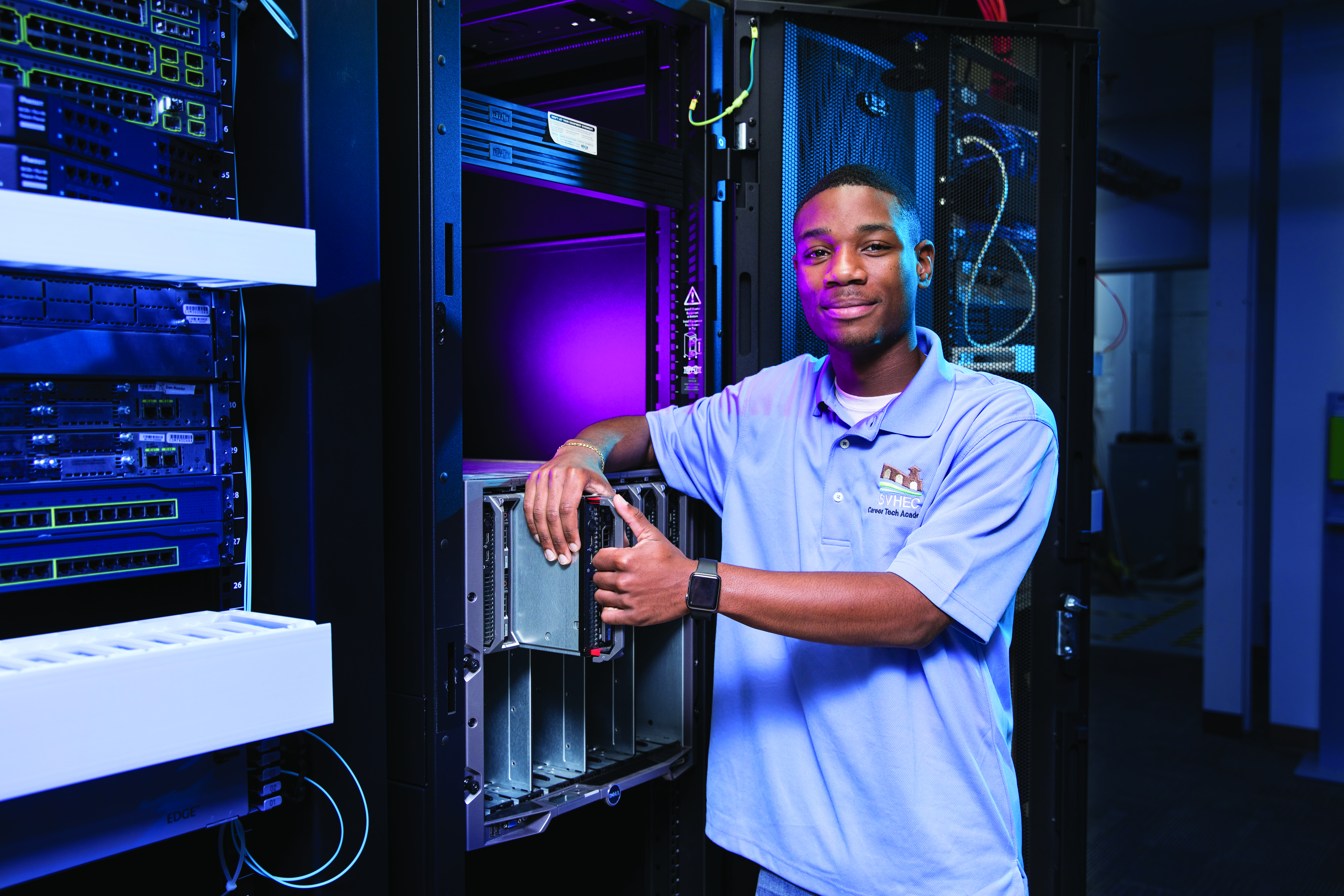The Backbone of AI
The facilities in the world’s data center capital underpin today’s most innovative technologies
Imagine an apartment building. The lobby entrance, residential door, and parking deck are all accessed and opened via a phone app. The resident takes their laptop to the pool and it automatically connects with Wi-Fi. The resident clicks “print” on the laptop, sending the document through the chosen printer no matter where the resident is. When a guest visits, the resident can give real-time instructions on which parking space to use, thanks to the app’s live smart parking information.
“All leasing and any interactions with the management company are conducted over the same phone application,” said Scott Brown, owner of Pixel Factory Data Center in Hanover County. Pixel Factory helps fiber optic ISP Internet Subway enable these services for apartment buildings and multifamily dwellings. That data goes back and forth from the residence to the data center. “It’s seamless. You can’t tell the data is traveling half a state away,” Brown said. Innovative digital applications like this allow property owners to differentiate their real estate offerings, to provide valuable amenities. “You can have the nicest marble and appliances, but the quality of internet is a differentiator. The younger generation knows how to measure and identify when the internet is substandard quality,” Brown said.
The Glue of the Internet
Data centers are the glue connecting the internet “pipes” running between all homes and businesses. The Pixel Factory provides secure and direct connections between half a million households, businesses, and content providers.
“It’s a central point and a meeting point where wireless fiber and wireline connections come back to one place,” Brown said. “The more concentration of networks and content that is in a data center, the more cost effective the services are for everyone. We’re enabling everybody who is an end user to get to Microsoft, Amazon, and Google to take the shortest path and get the lowest latency possible with the highest input.”
We’re enabling everybody who is an end user to get to Microsoft, Amazon, and Google to take the shortest path and get the lowest latency possible with the highest input.
Since 2017, Virginia Beach has been one of the Eastern Seaboard connection spots for three (soon to be four) subsea cables connecting the United States to Europe, South America, and, eventually, Africa. This connectivity has helped data centers become a big business in Virginia, a business that continues to grow.
In late 2022, the Pentagon awarded cloud computing contracts, totaling $9 billion through 2028, to Amazon, Google, Microsoft Corp., and Oracle Corporation. The Joint Warfighter Cloud Capability contract will provide the cloud computing network for the Pentagon’s modern war operations, sharing access to government data and intelligence with the U.S. military worldwide. All four companies have a Virginia data center presence, along with offices in the Commonwealth.
AI’s Data Needs
One reason for the rise in data centers is the rise of artificial intelligence.
“We’re making investments in infrastructure and data centers, and that is important to be able to bring the benefits of AI to American workers, students, and small businesses,” said Karen Dahut, the Google Public Sector CEO. “Data centers and racks of computers generate the compute power to really power the AI movement, so we continue to make investments in states like Virginia to continue to power our position of being first across AI in the globe.”
Many companies are determining how best to use AI to improve efficiency, including automating processes so employees can focus on higher-level work and more customer-focused efforts. AI can improve productivity, making jobs more satisfying by allowing people to work on new initiatives and strategies, or on activities requiring more thought, rather than lower-level tasks that AI can tackle.
AI requires powerful cloud systems, and data centers power these innovations. Virginia’s strong data center infrastructure is a draw, but companies are also focused on ensuring a robust local workforce to staff the facilities. Amazon is among the companies drawn by that workforce — Amazon Web Services (AWS) Director of Economic Development Roger Wehner called Virginia “a world leader in innovation and cloud computing, thanks to its investment in a robust, highly skilled workforce and emphasis on long-term public and private partnerships.”
Amazon has sought to press that advantage, partnering with 13 Virginia community colleges on a cloud computing degree specialization that, when launched at Northern Virginia Community College (NVCC) in 2018, became the first of its kind in the country. Amazon also partners with NVCC on an apprenticeship program that trains veterans for cloud computing positions with the company, including a 16-week educational program and on-the-job training at AWS’ Fairfax County headquarters. Apprentices come away from the program with several technical industry certifications.

Southern Virginia Higher Education Center, Halifax County
Training the Future of Data Centers
The Commonwealth is focused on educational plans at multiple levels to ensure those data centers remain staffed with qualified team members. That means putting programs in place for up-and-coming generations to get ahead of the curve.
“We have to make sure the school systems are aware of the opportunities coming to work on HVAC and electrical,” Brown said. “There are opportunities for the younger generations to get into very well-paying trades.”
Big tech companies are also concentrating on the workforce. Google has a strong legacy of investing in people to help teach, train, educate, and broaden their understanding of technology and AI, and the company launched a $75 million AI Opportunity Fund earlier this year, aimed at helping lower-income Americans learn essential AI workforce skills.
“It can create economic opportunity. It can address some of America’s most complex and pressing challenges, but only if people really understand it and find it easy to embrace,” Dahut said. “And so we really focus on educating the American citizenry, to help them advance their own skill set so they become those skilled workers we all rely on to deliver on the promise of technology.”
Microsoft has collaborated with local educational institutions to facilitate workforce training through its flagship Datacenter Academy program. The program’s 18 global locations include facilities in Loudoun County, near “Data Center Alley” in Northern Virginia, and in Halifax and Mecklenburg counties near the company’s Southern Virginia facilities. This program helps prepare students for IT careers, including at data centers. Microsoft donated servers and other equipment to the participating schools to build working data center-like labs.
Pixel Factory’s Brown is optimistic that workforce development programs in Virginia will make an impact. “I believe it is going to trickle down. With all this new growth in the region, the effect is going to be amazing. I’m excited about that,” he said. “It’s going to bring businesses the opportunity to do things they’ve probably never done before, to explore new verticals and expand services.”
The Richmond region is expecting a massive influx of new data centers, Brown said, and he’s been happy to see elected officials hungry for information on how to make them as successful as possible. “I have had more interaction with every regional and local county official in the last 12 months than I’ve had my entire career in the Richmond region,” Brown said. “They’re all looking to be better educated to make sure they’re making the correct decisions and the most informed decisions about how to integrate these facilities into the region, and to make sure that they’re good corporate citizens.”




